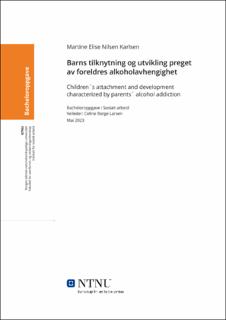| dc.contributor.advisor | Larsen, Celine Borge | |
| dc.contributor.author | Karlsen, Martine Elise Nilsen | |
| dc.date.accessioned | 2023-07-11T17:31:49Z | |
| dc.date.available | 2023-07-11T17:31:49Z | |
| dc.date.issued | 2023 | |
| dc.identifier | no.ntnu:inspera:146720930:72065290 | |
| dc.identifier.uri | https://hdl.handle.net/11250/3078133 | |
| dc.description.abstract | Alkohol er det mest utbredte rusmiddelet i Norge, og derav vokser mange barn opp med foreldre med alkoholavhengighet. I denne litterære oppgaven vil det diskuteres hvordan et slikt oppvekstmiljø kan ha påvirkning på barns utvikling. Dette vil bli tematisert i lys av tilknytningsteorien, med hovedfokus på det tidlige samspillet mellom omsorgsgiver og barn. Sentrale elementer i oppgaven blir Ainsworths tilknytningsstiler, emosjonsregulering og toleransevinduet og risiko- og beskyttelsesfaktorer.
I arbeidet med oppgaven er litteraturstudie benyttet som metode. Det er derfor blitt brukt allerede eksisterende litteratur og forskning rundt tilknytning, utvikling, barn av mennesker med alkoholavhengighet og skadelige omsorgssituasjoner. Som følge av foreldres alkoholavhengighet, kan det se ut til at barns tidlige tilknytning kan bli berørt. Disse barna er mer utsatt for manglende respons fra omsorgsgiver, uforutsigbare foreldre og omsorgssvikt, og har dermed høyere sannsynlighet for å få en utrygg tilknytningsstil. Når det gjelder disse elementenes påvirkning på utvikling, kan det se ut til at barn av foreldre med alkoholavhengighet, har større sannsynlighet for å få senere psykososiale vansker. Til tross for dette kan barn ha beskyttelsesfaktorer i oppveksten, som hindrer de tilstedeværende risikofaktorene å få spillerom. Slik kan mange barn av foreldre med alkoholavhengighet likevel klare seg bra. | |
| dc.description.abstract | Alcohol is the most common drug in Norway, and as a result, many children grow up with parents with alcohol addiction. In this literary thesis, there will be discussed how such an upbringing environment can affect children's development. This will be thematized with attachment theory, with a main focus on the early interaction between caregiver and child. Key elements in the thesis are Ainsworth's attachment styles, emotion regulation and tolerance window, and risk and protective factors.
In working with this thesis, literature review has been used as a method. Therefore, existing literature and research on attachment, development, children of people with alcohol addiction, and harmful care situations have been used. As a result of parents' alcohol addiction, it seems that children's attachment can be affected. These children are more vulnerable to lack of response from caregivers, unpredictable parents, and neglect, and therefore have a higher likelihood of developing an insecure attachment style. Regarding the impact of these elements on development, it seems that children with parents with alcohol addiction are more likely to experience later psychosocial difficulties. Despite this, children may have protective factors in their upbringing that prevent the present risk factors from having room to play. Thus, many children of parents with alcohol addiction still do well. | |
| dc.language | nob | |
| dc.publisher | NTNU | |
| dc.title | Barns tilknytning og utvikling preget av foreldres alkoholavhengighet | |
| dc.type | Bachelor thesis | |
